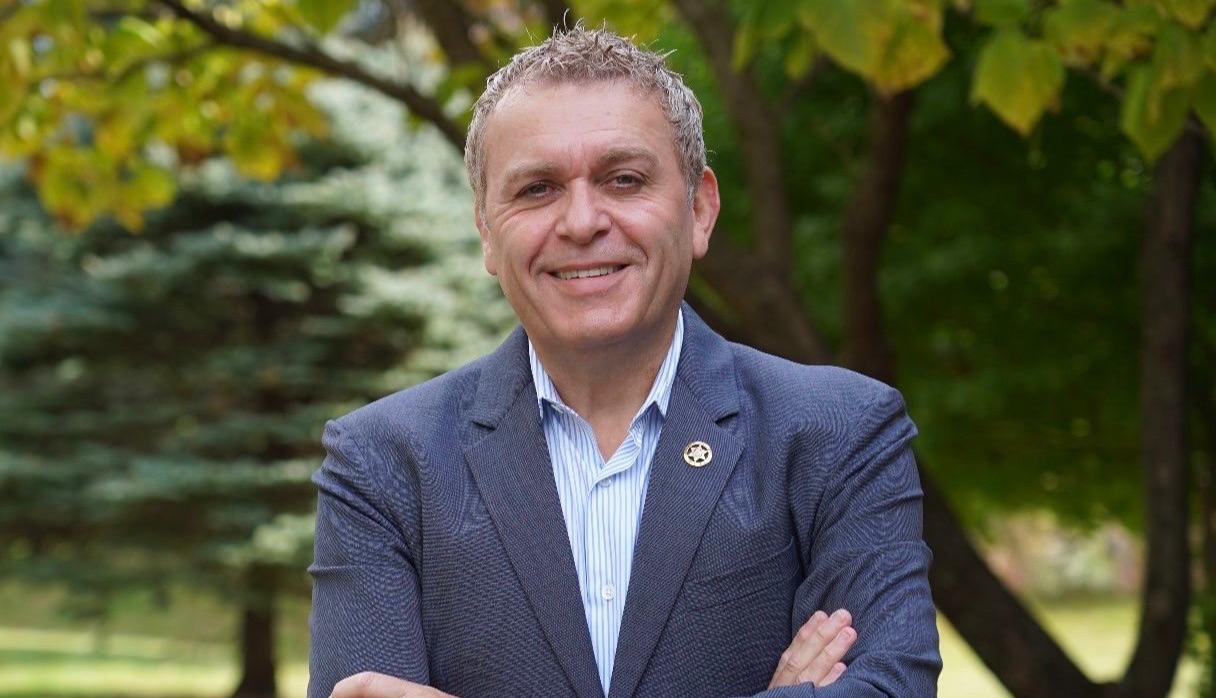
César de Paço “I’m Portuguese and deeply patriotic. I don’t believe in dual nationality.”
Interview with César DePaço by LusoPress
César de Paço, known in the United States as César DePaço, is originally from the Azores and proudly embraces his Portuguese nationality, refusing to accept any other. A staunch conservative, he openly supports right-wing political ideology, Donald Trump, and the CHEGA party. César de Paço arrived in the U.S. in 1994 and is now a successful entrepreneur in the bulk production and distribution of chondroitin sulfate for the pharmaceutical, nutraceutical, and food industries. But there’s much more beyond his business interests, and LusoPress caught up with him in New Jersey to discuss his personal and professional journey.
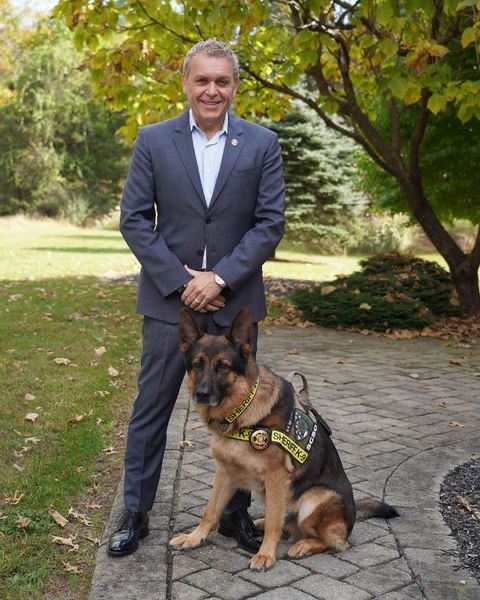
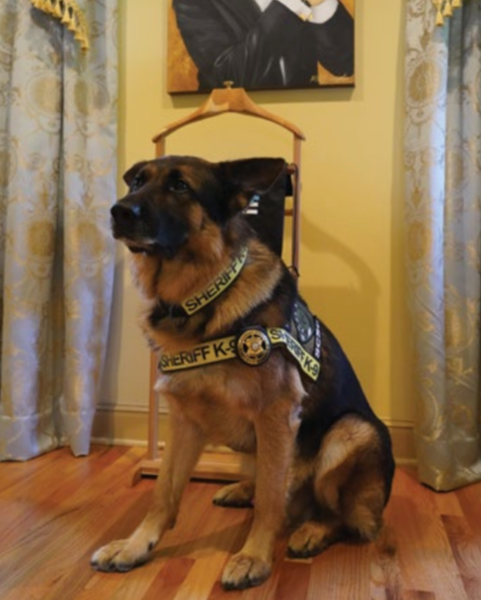
You’ve lived in the U.S. for almost three decades, but you reject American nationality. Why?
I’m Portuguese and deeply patriotic. I don’t believe in dual nationality. I was born in Madalena, on Pico Island, in 1965, but I don’t have any deep connections to the island. This happened because my father was a civil servant and led nearly all the tax offices in the Azores. At that time, he was responsible for the tax offices in Madalena do Pico and São Roque do Pico. That’s why I was born there. Although I’m Azorean and proud of it, above all, I’m Portuguese. And only Portuguese.
Did this decision impact your personal and professional life in the U.S.?
Yes and no. I have always been a strong supporter of law enforcement, and when I arrived in the United States at 29, I wanted to join the police force. I wanted to be part of law enforcement. This was all before I entered the business world and started the company, but to do that, I would have had to become an American citizen. Since I came to the U.S. through my mother, who had been an American citizen for 33 years, I could have obtained American citizenship. But I didn’t want dual citizenship. I’m Portuguese. That’s why I couldn’t pursue a police career.
Is that why you started donating to fire departments and, particularly, the police?
I think it’s essential to support law enforcement, especially now, in these crazy times. Everything I do for law enforcement is a passion—a hobby. I do it because I genuinely feel it and see a need for support. I can’t imagine living in a world without security forces. But it’s funny; some criticize those who finance police departments, but these critics are the first to call for help, forgetting that help costs money.
You arrived at our interview accompanied by your personal security and Lanzer, a German Shepherd police dog who proudly displays his K-9 sheriff badge. How long have you had him?
Lanzer has been with me for two years.
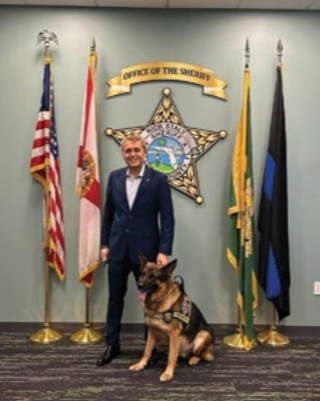
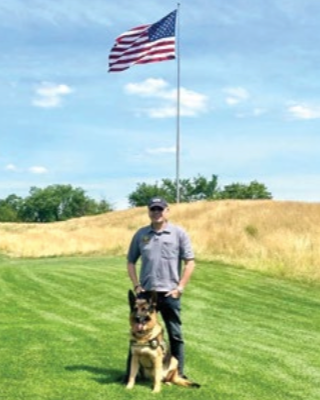

Was there ever a dangerous incident?
No. Thankfully, he has a good life. He’s trained every week and accompanies me everywhere.
Is he an example of the type of canines you provide to law enforcement?
Yes. I started by helping buy dogs for security departments that needed them but didn’t have the financial resources. In this regard, one could say that money makes this help possible, as these dogs are bred and trained in Europe, especially in Germany, the Netherlands, Poland, and the Czech Republic. People may not know, but these dogs—German Shepherds or Belgian Malinois—can cost up to $40,000, depending on the type of training they receive.
When did you start making these donations to the police? And how many dogs have you donated?
I started in 2014 and have donated nearly 270 dogs.
Only in the United States?
No. For example, in 2015, there was a terrorist attack in Paris. A police officer in the French capital sent one of his dogs into an apartment rigged with explosives to search for the terrorists. The dog was killed. I personally invited that French officer to come to the U.S. to receive another dog. He spent three or four days with the chosen dog, which cost around $15,000, and I arranged for their return to Paris. Beyond this case, I have also donated dogs to Portugal, including two to the National Republican Guard (GNR).
So, have police dogs also lived with your family for years?
That’s an amusing story. I love dogs; I always have. In 2014, I bought a German Shepherd like Lanzer. His name was Casanova. At the time, I got him from Texas; he had come from Germany. I wanted him for my personal security. Shortly after, I learned that a New Jersey police department had lost a canine in 9/11 and didn’t have the budget to replace it. So, I thought, “I have a $30,000 police dog here—I can donate him to the police.” So, I decided to contact the department, and they gladly accepted, although they were surprised at such generosity for such a valuable animal.
Was that the first donation you made?
Yes and no because my eldest daughter, who was three at the time, started crying and wouldn’t let me take Casanova. I apologized, but I wasn’t going to upset my daughter; she was very attached to Casanova. So, I decided to help in another way. I told them to choose a dog and send me the bill, and I would pay for it. And so it went. But I’ve also donated patrol cars, weapons and ammunition, bulletproof vests, and motorcycles. Whenever I make a donation, requests for help start pouring in. It happens because they genuinely need help. I regret not being able to do more—I do what I can, not for display or publicity. Much of what I do isn’t even made public. I wish there were more people doing the same.
Despite having built your fortune and family in the U.S., you resisted living out your own American dream for many years. How did it all happen?
After her divorce, my mother moved to the United States and kept urging me to join her. I left the Azores early; at 17, I went to the United Kingdom to study psychology. I have always loved traveling and wanted to see the world—I think that’s part of the Portuguese DNA. So, I traveled around Europe for a while, then moved to Australia and later decided to go to Thailand.
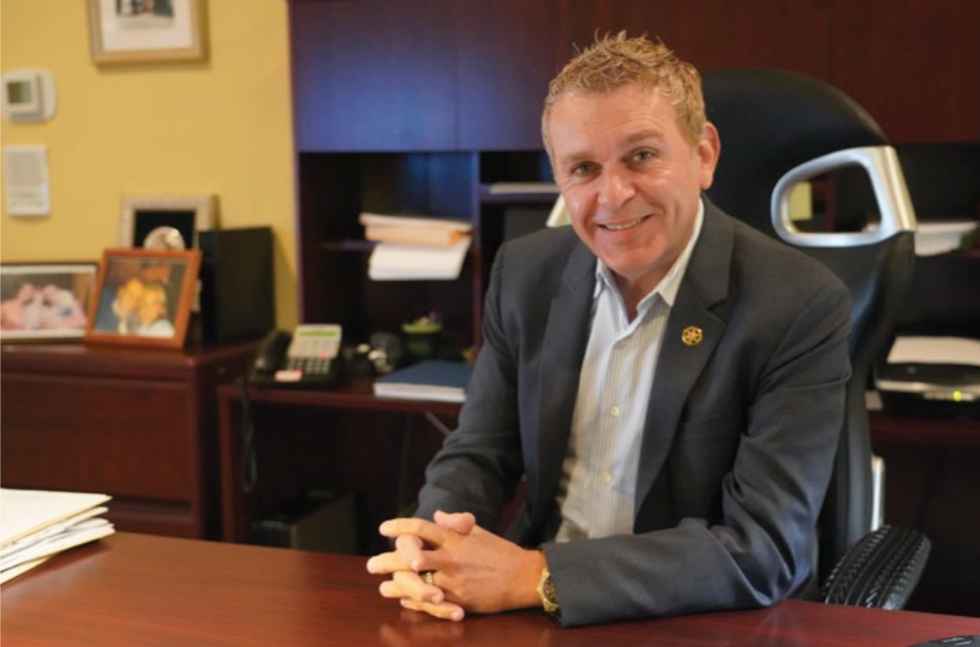
How did you end up in Cambodia, a country that eventually led you to the U.S.?
During my time in Thailand, I met a friend who was at a university in Cambodia. The country had been closed off for several years, and when the United Nations entered Cambodia, they aimed to gradually open it to tourism. This led to increased investment and foreign interest. This friend, who worked for a hotel company, invited me to visit the Grand Hotel in Siem Reap. It was a French colonial-era hotel that had become very rundown, and his company had recently acquired it. He invited me to spend a day there and catch up. This was in February 1993.
This happened during Cambodia’s general election year and amid a terrorist attack orchestrated by the Khmer Rouge movement led by communist dictator Pol Pot.
After a day of sightseeing with the couple, who happened to be American, we returned to the hotel early in the evening, and I went up to my room. It was on the third floor, with no working elevator or air conditioning. Around 1 a.m., I was awakened by a noise I couldn’t identify—I thought it was kids playing with firecrackers. Suddenly, I heard a click, and at first, I didn’t feel anything. Shortly after, I touched my forehead and realized it was wet. I looked in the mirror and saw I was bleeding—I had been hit by a stray AK-47 bullet.
Who helped you?
I was bleeding quite a bit. I left the room to get help and encountered two Frenchmen, bodyguards for President François Mitterrand, who was scheduled to visit the city the next day. The attack was allegedly in protest of his visit. They took me to a United Nations vehicle, neutral in the conflict, which transported me to the hospital. They told me I was lucky—a millimeter higher, and the bullet wouldn’t have exited. I even found the bullet in my room the next day. I still keep it with me to this day.
Was this incident what led you to the U.S.?
My mother, who lived near Newark, always urged me to move closer to her. But I never liked that area; I had no desire to be there. At the time, I needed a visa to enter the U.S., and my mother applied for one on my behalf, but I didn’t follow through. Until the day she called to tell me about my grandfather’s health condition. Then I started working on the documents to visit my grandfather in the U.S. It took about three months to gather all the paperwork and legally enter the country; we had to have a criminal record and even pass medical exams, like the HIV/AIDS test.
Did you come and stay?
No, I stayed for three weeks, then returned to Thailand. It was only a year later, in 1994, that I decided to move to the United States permanently. I arrived and initially worked as a psychologist. Then, in early ’97, I met someone connected to the pharmaceutical industry, and we founded Summit Sourcing Inc. We focused on selling chondroitin sulfate (a natural cartilage component used in dietary supplements and medications for joint issues). At that time, the chondroitin sulfate sold in the U.S. was manufactured in Europe. Everything went well until the late ’90s, when BSE (known as mad cow disease) hit Europe, causing distrust and fear among American consumers.
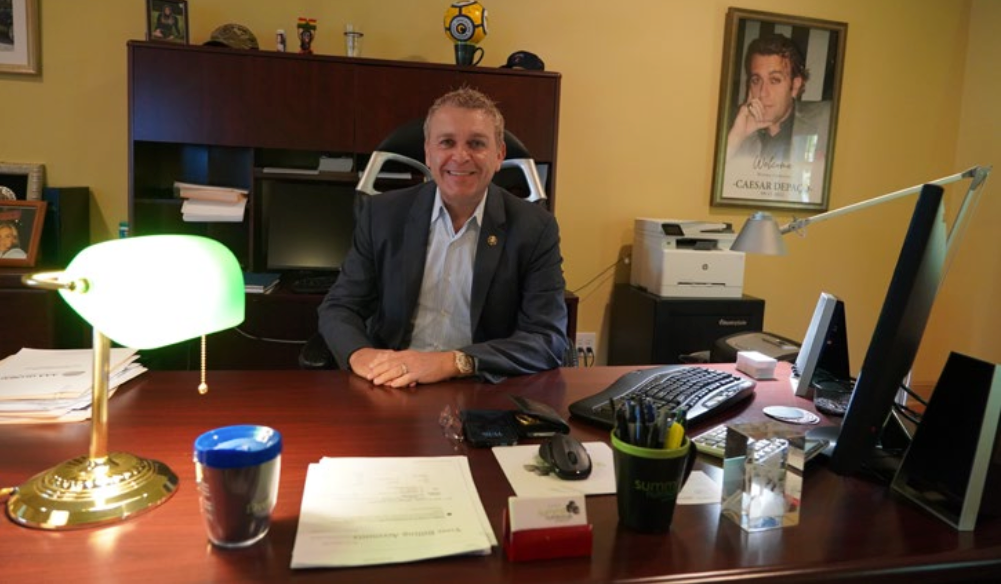
Did this lead to changes in the company?
We were importing a lot from Germany and Denmark. Suddenly, we couldn’t sell anything, and I realized we needed to pivot. I closed the company and founded the current one, Summit Nutritionals International, in 2001. I switched to selling chondroitin sulfate produced entirely in the U.S. and obtained an official certification from the U.S. Department of Agriculture, ensuring no risk or cases of BSE in the country. By no longer importing, costs dropped significantly, and profits skyrocketed. Within a few years, I made the company a global market leader.
To which countries do you currently sell?
Almost worldwide. We extract chondroitin sulfate from various animals to ensure quality products for different markets, such as India, where they don’t consume bovine products, so we provide chondroitin sulfate extracted from avian cartilage. In Asian countries, where pork and shark meat are common, we produce the product from the cartilage of these animals.
For six years, you served as Portugal’s Honorary Consul in Florida. How was that experience, which inevitably brought you closer to Portuguese communities in the region?
Until I was appointed Honorary Consul of Portugal, I hadn’t had much connection with the Portuguese community in the U.S. But that appointment brought me closer, and I gained insight into the realities these communities face and the difficulties they encounter. From 2014 to 2020, I became closely involved with the Portuguese community and helped a lot, especially children who needed certain surgeries and lacked the financial means. I did and continue to do what I can whenever I see a real need. I spent nearly half a million dollars annually to keep the consulate operational.
We received many official visits and praise from all sides. When I requested to step down due to an incompatibility with the Portuguese ambassador, many people expressed regret over my decision and said I had given the Portuguese community in Florida the best consulate ever, in every sense.
A few years after stepping down, how do you see the future of the Portuguese community in Florida and New Jersey?
Honestly, I think the Portuguese are somewhat divided and even envious of each other. I believe if there were more unity, everyone would be better off, and everyone would benefit. Here in the U.S., immigrant communities go through cycles. For example, on Ferry Street (New Jersey), there was even a sign that said "Portugal Avenue"—I don’t know if it’s still there. It was entirely dominated by Portuguese businesses and services in 1994 when I arrived in the U.S. Today, Portuguese shops are rare; there are more Hispanic and Brazilian stores. So, it’s a phase... and that’s also why I’ve generally kept a bit more reserved within the Portuguese community in the U.S. I genuinely wish we were more united.
2024 will go down in U.S. history with either Donald Trump’s return to the White House or the election of the first woman to the White House. Which outcome do you believe is best for the country?
I am 100% conservative, but I try to stay neutral in politics. However, the United States is a Republican country, and I believe that will prevail in the election.
Emigration is one of the key issues for Republicans and right-wing parties like CHEGA. Since you’re also an immigrant and don’t hold dual citizenship, how do you view this issue?
I am a right-wing individual and have followed that political ideology from a young age. In Portugal, I joined the CDS (Social Democratic Center) when I was 17. I currently follow CHEGA. I think people have a misconception about the party’s ideology. CHEGA is not racist nor anti-immigration; they are against illegal, uncontrolled immigration. And that is entirely different.
But everyone is against illegal immigration. The question is, how do you address an existing issue?
I am in favor of immigration as long as it is like my experience. I came to the U.S. legally, even though it took three months to complete the necessary documents. What’s happening at the Mexican border is indescribable. They are quicker to help illegal entrants than they are to help American citizens in need. That, to me, makes no sense.
I see you have two portraits of Donald Trump in your office. Do you know him personally?
Yes. I see him daily, especially in the summer, because we live in the same club at that time of year. In winter, he goes to Florida, so we don’t meet as often. He’s quite fond of Lanzer, and my youngest daughter often plays with his grandchildren.
Can we conclude that you’ll be voting for Trump?
No. I’m not a registered Republican. I remain neutral.
Portuguese of Value 2025 | César DePaço
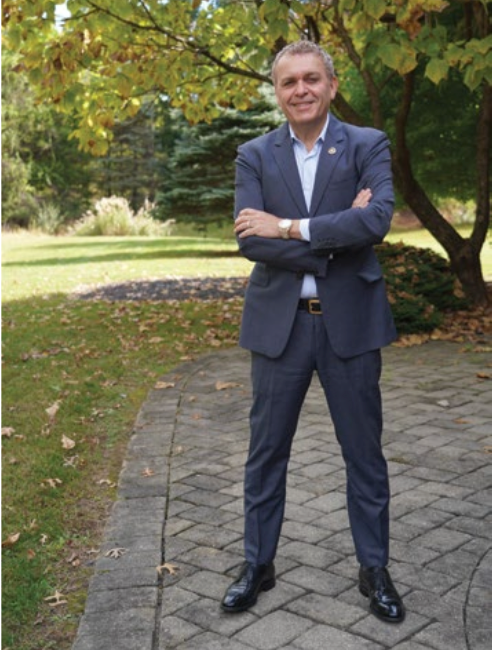
César de Paço, an Azorean businessman living in the United States, was born in Madalena on Pico Island (Azores). His life abroad began early; at 17, he went to study psychology in the United Kingdom. With a naturally adventurous and fearless spirit, César de Paço went on to live in France, Cyprus, and Australia before reaching Asia, where he lived until his eventual move to the U.S. He spent time in Thailand and Macau, but a terrorist attack in Cambodia led him to reunite with his maternal family in the United States. In 1994, at 29, César de Paço completely changed his professional life with his move to the U.S. Married, father of five, and passionate about dogs, he is a successful entrepreneur in the production and sale of dietary supplements based on chondroitin sulfate. He was involved in creating and managing Summit Sourcing Inc.
At the turn of the millennium, he closed the company to found his current project, Summit Nutritionals International. Additionally, César de Paço has an extensive history of philanthropy, with numerous charitable contributions in both Portugal and the U.S. He has donated millions of euros to various volunteer fire departments, including firefighting vehicles. He has also supported law enforcement agencies by providing highly trained police dogs, patrol cars, and equipment. He served as Honorary Consul of Portugal to the United States for six years, from 2014 to 2020, representing Portugal in Palm Coast, Florida.
He closely engaged with the communities in that region and was widely praised by the Portuguese diaspora for how he managed the consulate. During his tenure, César de Paço made a point of organizing Portugal Day celebrations in Palm Coast. In 2020, he stepped down due to incompatibility with the Portuguese ambassador. He has received numerous honorary titles and awards from police and security departments in the United States, including his most recent title, Honorary Colonel, awarded by the Brigham City Police Department in Utah in early 2023. He has also been recognized for his contributions to both American and Portuguese institutions.